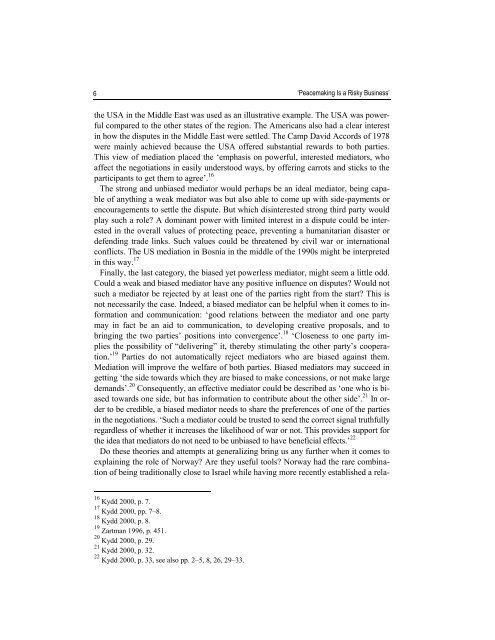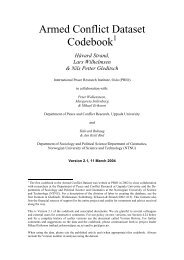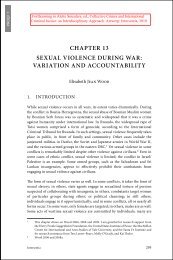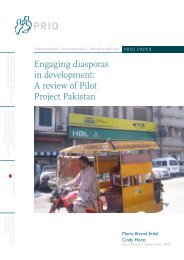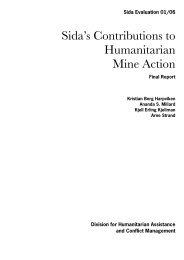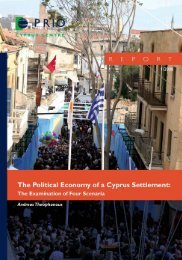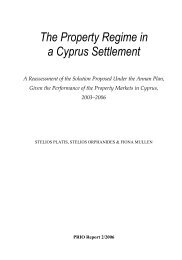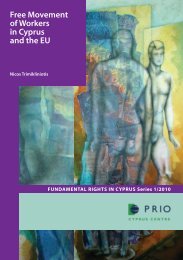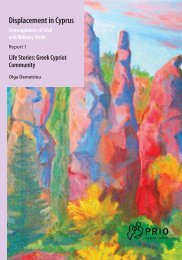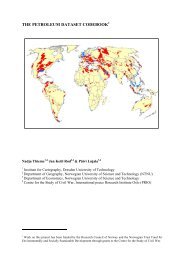Peacemaking Is a Risky Business - PRIO
Peacemaking Is a Risky Business - PRIO
Peacemaking Is a Risky Business - PRIO
You also want an ePaper? Increase the reach of your titles
YUMPU automatically turns print PDFs into web optimized ePapers that Google loves.
6 ‘<strong>Peacemaking</strong> <strong>Is</strong> a <strong>Risky</strong> <strong>Business</strong>’the USA in the Middle East was used as an illustrative example. The USA was powerfulcompared to the other states of the region. The Americans also had a clear interestin how the disputes in the Middle East were settled. The Camp David Accords of 1978were mainly achieved because the USA offered substantial rewards to both parties.This view of mediation placed the ‘emphasis on powerful, interested mediators, whoaffect the negotiations in easily understood ways, by offering carrots and sticks to theparticipants to get them to agree’. 16The strong and unbiased mediator would perhaps be an ideal mediator, being capableof anything a weak mediator was but also able to come up with side-payments orencouragements to settle the dispute. But which disinterested strong third party wouldplay such a role? A dominant power with limited interest in a dispute could be interestedin the overall values of protecting peace, preventing a humanitarian disaster ordefending trade links. Such values could be threatened by civil war or internationalconflicts. The US mediation in Bosnia in the middle of the 1990s might be interpretedin this way. 17Finally, the last category, the biased yet powerless mediator, might seem a little odd.Could a weak and biased mediator have any positive influence on disputes? Would notsuch a mediator be rejected by at least one of the parties right from the start? This isnot necessarily the case. Indeed, a biased mediator can be helpful when it comes to informationand communication: ‘good relations between the mediator and one partymay in fact be an aid to communication, to developing creative proposals, and tobringing the two parties’ positions into convergence’. 18 ‘Closeness to one party impliesthe possibility of “delivering” it, thereby stimulating the other party’s cooperation.’19 Parties do not automatically reject mediators who are biased against them.Mediation will improve the welfare of both parties. Biased mediators may succeed ingetting ‘the side towards which they are biased to make concessions, or not make largedemands’. 20 Consequently, an effective mediator could be described as ‘one who is biasedtowards one side, but has information to contribute about the other side’. 21 In orderto be credible, a biased mediator needs to share the preferences of one of the partiesin the negotiations. ‘Such a mediator could be trusted to send the correct signal truthfullyregardless of whether it increases the likelihood of war or not. This provides support forthe idea that mediators do not need to be unbiased to have beneficial effects.’ 22Do these theories and attempts at generalizing bring us any further when it comes toexplaining the role of Norway? Are they useful tools? Norway had the rare combinationof being traditionally close to <strong>Is</strong>rael while having more recently established a rela-16 Kydd 2000, p. 7.17 Kydd 2000, pp. 7–8.18 Kydd 2000, p. 8.19 Zartman 1996, p. 451.20 Kydd 2000, p. 29.21 Kydd 2000, p. 32.22 Kydd 2000, p. 33, see also pp. 2–5, 8, 26, 29–33.


